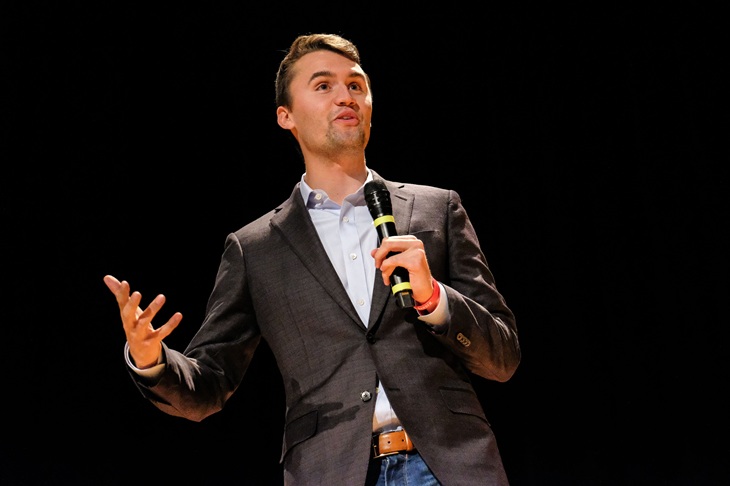
Charlie Kirk speaks at Culture War Turning Point USA event at the Ohio State University in Columbus, Ohio on October 29, 2019. The organizations mission is to identify, educate, train, and organize students to promote conservative principles. - They like his straightforward speaking style, his policies on immigration and the economic boom achieved during his administration. They are still teenagers, or just past 20. In a year from now, they will vote in their first presidential election in key swing state Ohio -- and they're giving Donald Trump their support. (Photo by Megan JELINGER / AFP) (Photo by MEGAN JELINGER/AFP via Getty Images)
UPDATE: The assassination of conservative figure Charlie Kirk has ignited a disturbing wave of political violence and hate speech across social media platforms. Just days after his death, conversations celebrating the act have gone viral, raising alarms about the normalization of such rhetoric.
In Sydney, Australia, where Kirk’s tragic demise has resonated deeply, a café scene reveals the chilling attitudes that have taken root. Patrons openly discussed the need for more political violence, shocking many who overheard. The comments, made with the same nonchalance as discussing the weather, illustrate a troubling shift in public discourse.
As the nation grapples with this loss, the echoes of Kirk’s assassination are felt far beyond Australia. Many commentators note that this incident marks a pivotal moment for free speech, with left-wing individuals openly expressing a desire for further violence against conservatives.
Developing reports highlight that social media is rife with calls for violence against public figures like Ben Shapiro and J.K. Rowling. Posts celebrating Kirk’s death have emerged, with users mocking his legacy and expressing relief at his assassination. One user even stated, “The only problem I have with Charlie Kirk’s death is that it didn’t happen sooner.” Such sentiments reveal a shocking desensitization to political violence.
This brutal reality reflects a broader trend where political opponents are dehumanized, and the line between discourse and violence becomes perilously blurred. Kirk’s death has not only shocked his supporters but has also raised urgent questions about the safety of public figures in an increasingly hostile environment.
A chilling statement from a young waitress in Sydney, who remarked that “Trump should have been killed before he had the chance to become President,” exemplifies this dangerous climate. The normalization of violent rhetoric has reached a point where it is discussed casually, as if it were an everyday topic.
The implications of this shift are profound. Political violence, once an unthinkable act, is now being trivialized, posing risks to free speech and public safety. Kirk’s assassination serves as a grim reminder of the consequences of such normalized violence, prompting calls for a reevaluation of how society discusses and handles political dissent.
In the aftermath, the focus has turned to what comes next. Authorities and commentators urge a return to civil discourse and a rejection of hate-driven rhetoric. The legacy of Charlie Kirk, they argue, should not be one of violence but of dialogue and understanding.
As conversations continue to unfold, the public must confront the reality that unchecked political violence threatens the very fabric of democratic society. The stakes have never been higher, and the time for action is now.
What to watch for: In the coming days, expect further reactions from political leaders and advocacy groups as the conversation around free speech and political violence evolves. The impact of Kirk’s death on public sentiment and political discourse will be closely monitored as society grapples with this urgent issue.
This is a developing story, and updates will follow as more information becomes available.







